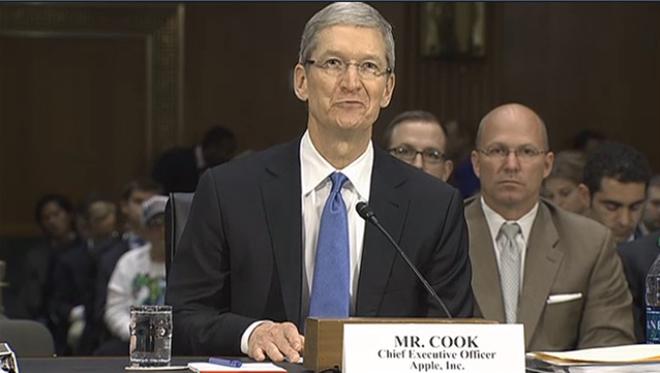In the midst of a larger discussion with U.S. senators on international corporate taxes, Apple CEO Tim Cook took an aside to discuss another area of regulation where the iPhone maker would like to see changes: the United States' intellectual property protection environment.
Senator Kelly Ayotte (R-N.H.) broke from the larger topic of discussion to talk intellectual property with Cook during Tuesday's Senate hearing on taxes. Asked by Ayotte about the intellectual property benefits of running a company based in the United States versus those in other countries, Cook responded that, actually, the U.S. system could use improvement.
"I actually think," Cook said, "that we require much more work on IP in this country."
The Apple chief's response appeared to take Ayotte aback, as she had been asking on intellectual property in the context of China, where bootleg Apple Stores have occasionally been known to spring up.
Cook specifically pointed out the slowness of the U.S. court system, which can take years to resolve or even come to trial. The process, Cook said, is ill-suited to deal with the realities of the technology sector, which can move through several cycles in the time it takes the court system to resolve one case.
"The U.S. court system is currently structured in such a way," Cook said, "that it's currently difficult to get the protections a technology company needs, because the cycle is very long."
Cook no doubt was referring to Apple's ongoing struggles with a variety of manufacturers making devices running Google's mobile operating system, Android. More specifically, the Apple head likely referred to South Korea's Samsung, which leveraged close knowledge of Apple's operations to turn itself into the world's largest smartphone manufacturer in terms of units sold.
Apple won a $1.05 billion verdict against Samsung when a jury found last year that Samsung had infringed numerous Apple patents. That decision, though, is currently wrapped up in the appeal process, and part of the verdict has been set aside, possibly for an entirely new trial.
Aside from that first verdict, Apple also has another suit in the U.S. against Samsung. Apple recently sought to add Samsung's newest flagship smartphone to that suit, alleging that the South Korean phone maker continues to infringe Apple patents. That suit, though, isn't scheduled to begin until 2014, underlining Cook's point on timing and cycles.
"For us, our intellectual property is so important to our company," Cook said. "I would love to see the system strengthened to protect it."
 Kevin Bostic
Kevin Bostic







-m.jpg)






 Charles Martin
Charles Martin

 Malcolm Owen
Malcolm Owen
 William Gallagher
William Gallagher

 Christine McKee
Christine McKee
 Wesley Hilliard
Wesley Hilliard









57 Comments
A small correction. I would love to see the system strengthened so that Samsung would get necked out of this country.
On top of the time issue there's all the suits by patent holding companies and things like how difficult it has proven for Apple to step in against Lodsys going after developers who are, according to Apple, covered by a patent exhaustion agreement paid for by Apple when they licensed the IAP tech from the previous owners. As soon as Apple said that the courts should have frozen all cases, barred Lodsys from starting anymore or doing any settlements while Apple's claim was validated. IF Apple was proven wrong then Lodsys could have at it.
Have to say that Cook did a very good job in dealing with the senators who really are looking for sound bites to show how strong they are against corporate america. He maintained his cool, and did not rise to the bait that they tried to get him to so they could look good.
Rand Paul's comment about "why are we even having these hearings on apple" made me reassess Paul in a much more favorable light. Plus it was funny.
Like bank robbers congress will go where the potential money is, and right now that is apple.
[quote name="charlituna" url="/t/157632/apple-ceo-tim-cook-says-americas-ip-environment-needs-more-work#post_2330720"]On top of the time issue there's all the suits by patent holding companies and things like how difficult it has proven for Apple to step in against Lodsys going after developers who are, according to Apple, covered by a patent exhaustion agreement paid for by Apple when they licensed the IAP tech from the previous owners. As soon as Apple said that the courts should have frozen all cases, barred Lodsys from starting anymore or doing any settlements while Apple's claim was validated. IF Apple was proven wrong then Lodsys could have at it.[/quote] Cook wisely did not bring that up - because it's a ridiculous argument. There's nothing illegal or immoral about patent holding companies suing (What Lodsys did is somewhat different). The so-called 'patent trolls' serve a useful place in helping to manage US IP.
That's the smarmiest frownsmile yet! That's the frownsmile of a man who knows he's absolutely in the right.
Tim Cook, showing Congress how to look smug.
That's some bush league smug there.